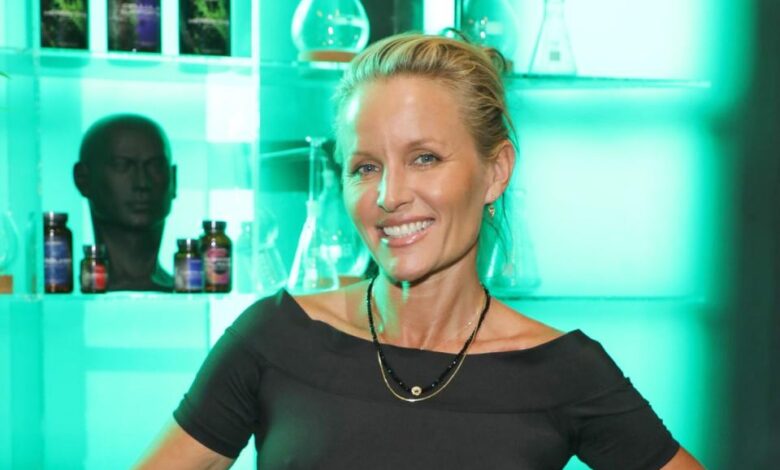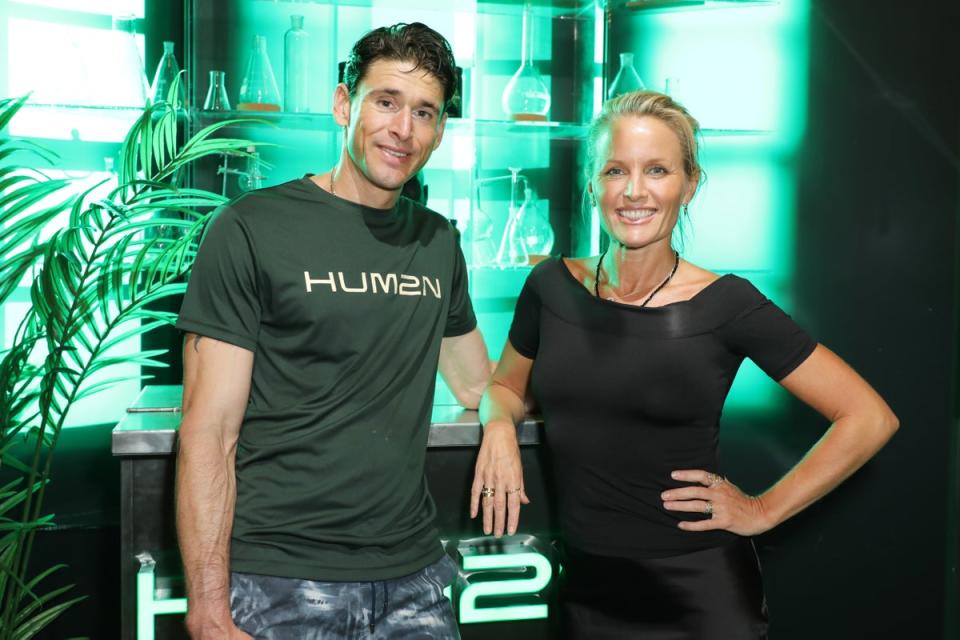Hollyoaks star Davinia Taylor on swapping wild nights for wellness

Davinia Taylor — former Hollyoaks actress and Primrose Hill party girl turned bestselling author and supplement founder — is sitting in a wellness clinic in Chelsea, talking me through the lifestyle changes that helped to turn her from hedonist alcoholic to clean-living wellness guru: going teetotal, dawn ice baths and runs in Hyde Park and — the reason we’re here today — daily biohacking, a practice that involves making small changes to your lifestyle to ‘boost’ your biology for improved health.
“It’s like a line of cocaine,” Taylor, now 45 and a mother-of-four, tells me of the high she now chases: the health kick, after years spent battling alcoholism and overeating. The soap opera star was a regular in the tabloids back in the noughties, known for getting hammered with Kate Moss and Sadie Frost and famously buying Noel Gallagher‘s Supernova Heights house in 2005.
But like Moss and Frost and many of that notorious Primrose Hill set, Taylor has cleaned up, hard. She is still an addict — she always will be — but she’s switched her targets. Today, her million or so Instagram followers are treated to daily updates on her workouts, wellness rituals (she’s tried everything from psychedelics to South American healing rituals using frog sebum and being burned) and biohacking tips (some questionable, like not wearing sunglasses to get daylight into your eyeballs early in the morning and reset your body clock).
Her wellness-focused grid is also packed with updates on her own-brand supplement line, WillPowders, and new book, Hack Your Hormones, which offers advice on how to harness the various hormones that influence sleep, mood, eating habits and stress levels and follows her hit 2021 book It’s Not A Diet, which sold 60,000 copies.
It all sounds very Gwyneth Paltrow, but Taylor is insistent she is no Gwynnie (“I’m the antithesis of Gwyneth!… I’m a failed actor, for a start. And I definitely didn’t consciously uncouple from my ex,” she said recently) and her brand, WillPowder, is far from turning into the actress’ $250 Goop empire — there’ll be no vagina-scented candles or wellness cruises, just supplements that she claims to boost “brain energy” lead to fewer carb cravings, and science-based advice.
Taylor poured hours into her new book, diving into medical journals and interviewing the likes of highly respected genetic epidemiology expert Professor Tim Spector. But today is up there with her biggest days so far. She has travelled back to her own stomping ground from her new home in Lancashire to interview two men she’s long been wanting to meet: NHS doctor and functional medicine practitioner Dr Mohammed Enayat, the founder of London biohacking clinic HUM2N (known by his alias Dr E), and the American biohacker Ben Greenfield.

“I’ve been stalking him for five years,” she says of Greenfield, like a giddy teenager who’s about to meet her favourite pop star.
The New York Times bestselling author certainly does have a star quality about him. Both men are here for a panel discussion with Taylor, and Greenfield comes across as charming, bold and immune to embarrassment, cracking jokes about vaccines giving kids resilience and patients putting things up their bottoms. “My vision for health is for every homeless man to one day have a suppository up their butt and stem cell injections for their dick,” he tells the crowd at one point.
Greenfield might be light-hearted when he talks about this stuff but at the core of it all is a serious message: he, Enayat and Taylor are here to share their belief that current healthcare is too narrow-minded. “I’ve had four boys, and every time I was pregnant the doctor told me to try acupuncture,” Taylor says of the NHS’s approach to medicine. “But they couldn’t prescribe me that, because it’s ancient Chinese medicine. So they ‘strongly encouraged’ me to do it. Because they know it works, they just don’t know how.”
Taylor’s argument is that the establishment’s supposed scepticism around ancestral therapies runs alongside a genuine aversion to newer, cutting-edge techniques. Her panellists agree. Despite being an NHS doctor himself, Enayat says the UK has a tendency to worship the NHS, placing it on such a high pedestal that we can’t see the cracks in the system until they slap us in the face.
“We’re seeing one of the worst health crises we’ve ever experienced,” he says, cautious about leaning too heavily on the service in which he works. People need to start taking responsibility for their health more, he believes, rather than rely on overstretched doctors who prescribe blanket remedies. “We need innovation. And that costs money.”
Enayat sees the private sector as holding the keys to the future of public health. Cryotherapy chambers, hyperbaric tanks, infrared light machines and IV drips are among the technologies available at his clinic, which feels closer to a superrich nuclear bunker than anything you’d see in the NHS. The clinic has also partnered with King’s College London to develop tests for its biohacking technology, which Enayat says is entirely scalable. “The idea is to use technology to democratise what’s happening here,” he explains. The timeline? “About five years.”

Enayat says he wants his clinic to integrate new therapies into healthcare and — more widely — revise how the UK apprehends medicine and takes charge of its wellbeing. “Patients need a personal health program,” he says. “It’s not one size fits all.”
So far, not too leftfield. Most of us would probably agree that our bodies and immune responses are all different. So what are Enayat’s more controversial ideas? First, he tells me that mental and physical health services should no longer be separated – an increasingly mainstream idea and a key facet of HUM2N’s approach. “The gut’s responsible for more than 90% of your serotonin production,” says Enayat. In other words: a patient suffering from anxiety and depression should consider their diet as one of the key factors in their condition.
Enayat also explains that his clinic is “not in the business of accepting symptoms as conditions, whether that’s IBS or chronic fatigue.” Those aren’t conditions? I ask. “No,” he says. They are the signs of underlying imbalances. “For decades we’ve understood health with regard to our organs. But we take the view that health is much more to do with the balance of our processes.” His theory has the same rhetorical whiffs as humourism, the Hippocratic belief that our health boils down to the four temperaments being in perfect equilibrium.

But HUM2N is neither traditional nor esoteric, and Enayat’s attempts to transform healthcare are rooted in the present; in what he sees, day to day, as a functional medicine practitioner and a doctor working for the NHS: a system that is broken; inflammation everywhere; statins prescribed en masse even though they increase the risk of cardiovascular disease for one in four patients; entire friendship groups of 12-year-old kids suffering from panic attacks. He disagrees with me that some of them might be putting it on, arguing much of their anxiety is a result of tech addiction.
Addiction is a particular interest of Taylor’s. She never knew where her addictive personality came from, she says, until her second child was diagnosed with ADHD. “The school sent me this list of symptoms,” she says, “and as I was ticking them off, I realised: this is me.”
Taylor has tried all kinds of wellness tips and tricks over the years since realising she had an addictive personality. She’s not keen on veganism, feeding her kids Lancashire lamb once a week, and is candid about some of the more woo-woo practices that haven’t worked for her, pointing to the scars on her arm that were left by Kambo, a healing ritual used mainly in South America and named after the poisonous secretions of a giant monkey frog. “I ended up at a shaman’s house in Tottenham,” she says. “All it did was make me throw up all night. I did have glowing skin the morning after, though.”
Kambo works, Taylor says, on people who have trauma to expunge from their body: “It felt like an exorcism.” But she has no trauma herself, “nothing repressed.”
Psychedelic therapy was just as ineffective. Her body, she claims, is naturally low on GABA (gamma-aminobutyric acid, the neurotransmitter that regulates sleep and anxiety). As for magic mushrooms: “all they did was make me more anxious,” she says.
Today, Taylor’s secret weapon is cold exposure, a popular therapy that’s become mainstream in recent years thanks to the likes of Wim Hof, Justin Bieber and Taylor’s hero Greenfield. “I teach my kids that if you’re in a bad mood, you can always start your day afresh,” she says, adding that cold exposure doesn’t have to be expensive.
“The water’s freezing in this country two thirds of the time,” she laughs. “And on the few months a year when it’s not, just go to the supermarket, buy some ice bags and empty them into the bath.” If you don’t have a bath at home, you can get a plastic tub for under £50.
Enayat jumps in and says it’s intruiging, how a conversation about health always ends up being a conversation about money. It was certainly a tony vibe at HUM2N, with tickets selling for upwards of £500 and the crowd a mix of well-spoken blondes in prairie dresses alongside Mind Valley CEO Vishen Lakiani, Made in Chelsea’s Alex Mytton and Dirtea founders Andrew and Simon Salter.
Taylor, a slim, honed, tanned mother-of-four and former party girl, fits right in. She runs downstairs to change out of her sports kit into a black silk skirt and high heels. You can take the girl out of Primrose Hill, but you can’t take Primrose Hill out of the girl.
Before leaving, I wriggle through the crowd and ask her one last question: what she’d tell her critics, or those who suggest cold therapy might cause hyperthermia (it can) and that exposing the eyes to UV radiation can cause cataract (also true)?
Those risks, she says, are not those we should be worried about. “It’s more dangerous not to have ice baths than to have them.”
I don’t know if that’s true, but it’s a good answer.




